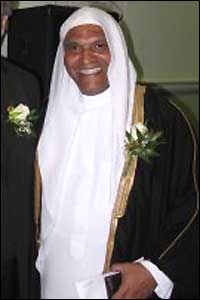|
|
||||
|
|
||||
| Home | Contents | Site Map | Links | Search |

|
|
|
Wild and Ferocious
|
December 1, 2007 - Do not take this lightly. This is worse even than Saudi Barbie.
This is the story of Muhammad the Teddy Bear, the latest scourge of Islam.
It all started in a Sudanese classroom. The kids were seven years old. Their teacher, Gillian Gibbons, 54, had an idea. She would have the children name a Teddy Bear, then practice writing about it. What should they name him? she asked her students.
"Abdullah!" said one.
"Hassan!" cried another.
But in the end, the name Muhammad was chosen, in honor of a boy in the class who also bore that name.
The children photographed the bear, and took turns taking it home on weekends. They kept diaries detailing what they did with it on these visits, then collected all the entries in a special book with the bear's picture on the cover and the label "My Name is Muhammad."
Cute? Hardly. When some parents saw the book, they complained. Ms. Gibbons was arrested and charged with insulting Islam. Muslim clerics in Sudan demanded she be whipped. At her trial Ms. Gibbons wept and insisted that she meant no harm. The court decided to be "lenient." It sentenced her to 15 days in prison and subsequent deportation to Britain. She could have received 40 lashes, six months in prison, and a fine. Such punishment would be in accordance with the sharia law upon which the Sudanese judicial system is based.

|
|
|
Protesters in Khartoum demand the execution of a teacher convicted of insulting Islam after her students named a teddy bear "Muhammad." (AFP - Getty Images)
|
Even sentencing Gibbons to expulsion was not enough to satisfy many Sudanese. On Friday thousands of Sudanese demonstrators flooded the streets, some armed with swords and clubs, others beating drums. They burned Gibbons' picture and demanded her execution. "Kill her, kill her by firing squad!" they shouted, and "No tolerance: Execution!" One sword-carrying demonstrator said: "It is a premeditated action, and this unbeliever thinks that she can fool us? What she did requires her life to be taken." Her life very possibly in danger, Gibbons had to be moved from the women's prison in Oumdurman to a secret location.
Muhammad Abdul Bari, head of the Muslim Council of Britain, expressed his dismay. "This is a disgraceful decision and defies common sense," he said. "There was clearly no intention on the part of the teacher to deliberately insult the Islamic faith." Bari's statement was a half-step in the right direction - if her intentions had been different, would she actually deserve jail, 40 lashes, and even death threats?

|
|
|
Sheikh Shaheed Satardien
|
A similar but much more emphatic statement was issued by Sheikh Shaheed Satardien of the Supreme Muslim Council of Ireland, who denounced the verdict and said he is "saddened that the Muslim world is silent on issues such as these and the punishment of the Saudi girl, but they are quick to issue decrees to justify and appease their political rulers." Satardien came to Ireland from South Africa. He found himself at odds with the Muslim majority in Ireland and became marginalized because of his moderate views. The Arab-dominated religious hierarchy, heavily influenced by the extremist views of Sheikh Yusuf al-Qaradawi, sidelined him, and he became the recipient of death threats. Clearly even in Ireland the Islamic leadership has a long way to go in fostering a tolerant image of their religion, while moderates like Satardien fight an uphill battle.
Some Sudanese feel the government is deliberately exploiting public anger for political purposes. According to Mariam al-Mahdi, a leader of the opposition Umma party, "The escalation is deliberate. There has been a strong official mobilization in the media and mosques against the so-called imperialists and the crusaders." Gibbons' defense lawyer indicated that Gibbons may have become caught up in the politics of Darfur and the government's resistance to Western interference. He told the Associated Press: "You take an event like this teacher incident, enlarge it and make a bomb out of it," to show that "Muslims in Sudan don't want these people (Westerners) to interfere, we want African troops."
Well, perhaps there is a simpler explanation. A spokesman for the Sudanese embassy in London said it all: "In our culture a teddy bear is a wild and dangerous animal. Itís not something to be cuddled by children." That's right, we must protect the children from wild and dangerous fur-filled Teddy, we must assure that they will never be threatened by such a ferocious predator, even if it means allowing or even encouraging armed mobs calling for their teacher's execution.
They think Muhammad the Teddy Bear is "wild and dangerous"? Maybe they think the ethnic-cleansing Janjaweed are cuddly, since at least the Janjaweed have government approval.
Sudan is a Muslim regime based on Islamic religious law. Israel is based on democratic principles. Yet here is another who has not responded to the Sudanese outrage: Saeb Erekat, who denies that anywhere but in Israel is there any government that identifies itself with religion.
Sources:
Agence France-Presse. "Teacher Faces Hate Charge Over Teddy Bear." National Post, November 29, 2007.
Fox News and Associated Press. "Boy Defends British Teacher Jailed in Sudan Over Naming of Teddy Bear Muhammad." FoxNews.com, November 27, 2007.
Gettleman, Jeffrey. "Calls in Sudan for Execution of British Teacher." New York Times, December 1, 2007.
McDonald, Henry. "Dublin imam takes on the fanatics." Guardian, January 14, 2007.
Osman, Mohamed, Associated Press Writer. "Calls in Sudan for Execution of Briton." SFGate.com, November 30, 2007.
Satardien, Sheikh Shaheed. Press Statement. Quoted by Mark Shteyn in National Review Online, November 30, 2007.
Zakaria, Rafia. "Faith and Conflict: An Irish Imam's Statements on Islamic Fundamentalism Unleash a Storm of Controversy Among Muslims in That Country." Frontline: India's National Magazine, February 10-23, 2007.
Israeli-Palestinian Conflict:
Peace with Realism